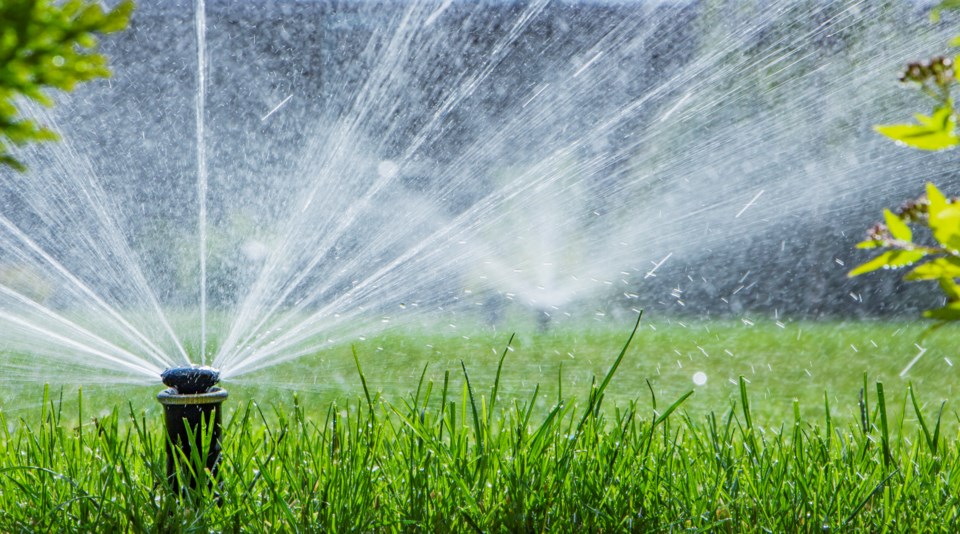Whistler wants you to change the way you use water—outdoors at least.
On March 19, the Resort Municipality of Whistler’s (RMOW) mayor and council voted to support a staff recommendation designed to reduce the volume of potable water used for irrigation purposes, “in order to preserve the current supply of high-quality potable water for domestic use and water storage for fire protection,” according to a staff report.
The report explained drought conditions in recent years are reducing the amount of water available from the municipality’s existing water sources, paired with increasing demand due to population growth.
“This reduced supply in the late summer period and increased consumption continues to stress the Whistler water system,” the report said, noting there is concern over the community’s supply being close to or below fire-protection requirements in summer months.
The use of potable water in automatic, in-ground irrigation for lawns, trees, shrubs, and flower beds was named as a low-hanging fruit in the search for ways to reduce water use.
Staff recommended changes to the relevant bylaw for outdoor potable water usage that would see the existing four-stage conservation program (which is determined by water supply stresses and seasonal changes) reduced to only three stages: the standard fall/winter/spring Stage 1, a summer schedule (Stage 2), and a Stage 3 that would apply severe restrictions on all water use.
The biggest change would be to Stage 2, described as “the normal summer season irrigation schedule,” and reduces the amount of time automatic, in-ground irrigation can be used from nine hours per day, seven days a week, to six hours a day, three days a week.
The new bylaw also divides Whistler neighbourhoods into two groups: Half that can irrigate on Mondays, Wednesdays and Fridays; and half that can irrigate on Tuesdays, Thursdays and Saturdays, leaving Sunday as an irrigation-free day.
“These schedules also create recovery periods for the water system to refill reservoirs,” reads the report.
Staff said adopting the changes will allow Whistler to conserve the existing water supply for domestic use, and keep the community’s supplies within tolerances for firefighting requirements.
During questions, Councillor Ralph Forsyth asked why Whistler doesn’t simply use non-potable water for irrigation, to which the RMOW’s utilities manager, Chris Wike, said there is not a parallel water delivery system.
Coun. Arthur De Jong noted the issue appears to be supply rather than infrastructure, and asked about additional water sources, to which Wike responded additional wells are very expensive, and a new well in Rainbow Park has been relegated to being used as a back-up by the province.
Coun. Jeff Murl had a few questions about the reservoir supply in Whistler, asking where the community’s water is held after it is pumped from wells or 21 Mile Creek, to which Wike explained the community has about a peak summer day’s worth of water capacity in various tanks on the hillsides around Whistler.
In what appeared to be a nod to industry concerns as laid out in a letter sent to the RMOW in response to the proposed bylaw changes, Coun. Cathy Jewett also queried how much engagement with the affected sectors was carried out, and Wike said they were informed of the proposed changes.
Commenting later, Jewett said she was aware changes to the bylaws will be tough for the irrigation sector, but that she weighed pressure on them with the risks to the community posed by wildfires.
“Unfortunately, we are living in a time where nothing is usual,” she said.
“It’s very important that we think of community safety, and that we’re ready when a wildfire hits, so I support ensuring that our water supply is robust enough in the case of any wildfire.”
The writer of the letter, Heike Stippler of Heike Designs, a local horticultural company, argued in remarks during the public comment period that the irrigation sector is not an enemy of water conservation, but an ally.
“We must reduce the waste of water, but cannot sacrifice plants and soil that actually help with a lot of the serious environmental issues we are dealing with,” she said.
In her letter, she argued plant health in the community will be impacted by the water usage changes by limiting the times they can be watered, and that healthy plant life is key to a healthy community in that they filter the air, cool their surroundings, sequester carbon, play a vital role in the local ecosystems and also minimize climate events.
“If plants dry out, we increase the fire danger tenfold, we raise the temperature in our neighbourhoods, we make our air more dusty,” she wrote.
Stippler also pointed out soil that dries out between waterings requires even more water, and when applied in shorter bursts, simply runs off the soil, so a healthier landscape is better for water use.
Stippler’s letter was submitted for council’s consideration, but did not sway the vote.
Council voted unanimously to approve the bylaw changes, as well as the required enforcement changes that will permit bylaw to ensure compliance. The bylaws were adopted later at the same meeting, and are now in effect.




